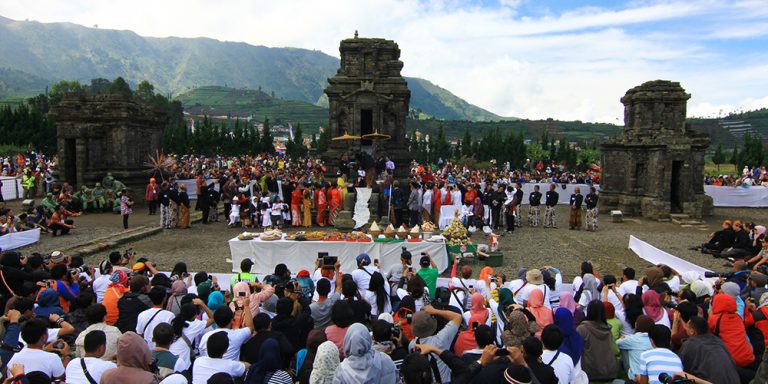By M. Dwi Cahyono
"Peruwatan" (Javanese term) is a process to eliminate impurities and restore to a good condition. There is a story depicted in the "Sudhamala" relief at Tegawangi Temple that tells about the benefits of "ruwat". The story is about Ra Nini, a demoness who was cursed by her own husband. However, she managed to undergo "ruwat" using Sahadewa, the youngest son of Pandawa, as the medium. After the "ruwat" process, Ra Nini successfully returned to her original form as the beautiful goddess Parwati or Uma, the consort of Lord Shiva.
In the 7th panel of the Sudhamala relief, Ra Nini, who was originally a demoness, transformed into the beautiful goddess Parwati (Uma) as her original form before the curse. The depiction in the relief shows Ra Nini facing forward, complete with a headdress, a circle around her head, and a lotus throne. She also has four arms and carries a water vessel and prayer beads in both hands, wearing grand clothing. Her two attendants also transformed into beautiful women and carry large fans. This story illustrates that "ruwat" can bring significant benefits to someone who wants to return to a good condition.
In the "Sudhamala" relief at the foot of Tegowangi Temple, there is a scene where Sahadewa offers his respects to Goddess Uma (Parwati) as a token of gratitude for serving as the "ruwat" medium to help Goddess Uma return to her original good condition. "Ruwat" is a Javanese ritual that has mystical power to cleanse a person from disasters or impurities and restore them to their original good condition. Ra Nini, who appears as a demoness in the story, symbolizes the impure condition that must be cleansed through "ruwat".
The construction of Tegowangi Temple in the 14th to early 15th century indicates that the "ruwat" ritual has existed since the Majapahit era. This tradition continues until today, especially in Bali, where "wayang ruwat" is performed as a form of "ruwat" ritual during the day. However, the "Sudhamala" story is rarely performed in Java nowadays, while the "murwokolo" story is more frequently staged.
In the "Sudhamala" story, Sahadewa was granted three things by Goddess Uma as a reward, namely the title "Sudhamala", the powerful arrow "Pasupati", and being led to find his true love in the Village of Prangalas. Hopefully, this explanation is useful for the readers.


No comments:
Post a Comment